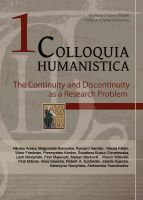Macedonian Language from the Perspective of its Balkan Environment (Language Tendencies)
Macedonian Language from the Perspective of its Balkan Environment (Language Tendencies)
Author(s): Marjan Markovik’Subject(s): Language and Literature Studies
Published by: Instytut Slawistyki Polskiej Akademii Nauk
Keywords: Macedonian Language; Balkan Languages
Summary/Abstract: In the past fifteen years, Macedonian standard language and its dialects have been subject to various changes effected for the purpose of establishing clearer and simpler communication. At dialectal level, Macedonian speeches are dissolving and fewer differences can be noticed between city and rural speeches. Take Ohrid speech as an example which had many inherited Slavic features, especially at the lexical and phonetical level, and which, on the other hand, from a Balkan perspective, is the innovational core of the Balkan linguistic tendencies, on both the verb level and in the morphosyntactics domain. The specific features of the speech of the old part – Varoš, are slowly vanishing and nowadays we can speak of an Ohrid speech specific for the other parts of the town as well, which has spread even deeper into the region. Among those that use Ohrid speech nowadays are also those whose parents were native speakers of the Aromanian (Vlach), and sometimes even Turkish or Albanian language. In their everyday use of the language they introduce the features inherited from their “Balkan code” and in this manner they increase the tendencies originating from the period of convergent development of the Balkan linguistic community (Видоески 1999: 253). On the other hand, Macedonian contemporary language is subject to various changes and accelerated development both due to the dissolving of dialects and to the need of adaptation of the influences of foreign languages. For example, the capital city, Skopje, with a population of almost half of the entire population in Macedonia, is losing part of its dialect features, the language spoken there is developing into a kind of sociolect and becomes carrier of what could be called contemporary Macedonian language.
Journal: Colloquia Humanistica
- Issue Year: 2012
- Issue No: 1
- Page Range: 81-95
- Page Count: 15
- Language: English

